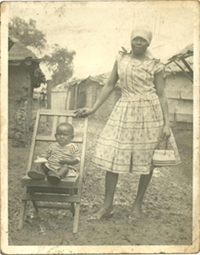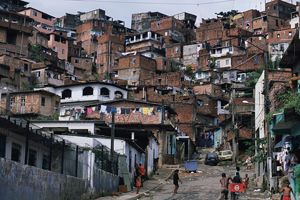Over one billion people live in urban communities without legal claim to the land they live on, according to Robert Neuwirth, author of Stealth of Nations, and expert on the informal economy and "shadow cities". This rise in informal housing is often driven by mass migration to cities by people seeking work or fleeing from conflict or environmental disaster. Informal status refers to more than just housing: In Jakarta, the personal ID card serves as an invisible divider between formal and informal residents, and is used as an excuse for denying rights to the marginalized population. Read on to see how the question of informality is being addressed in five cities across the globe -- then join the discussion on urb.im, a hub for practitioners working to create just and inclusive cities.

Mathare slum, Nairobi's oldest informal settlement, has been a lucrative investment for corrupt landowners who take advantage of the perceived absence of a legal framework. The Mathare Family Picture Archive (MFPA), started as a research and advocacy tool, and provides a permanent archive for slum dwellers while promoting a shared sense of history and identity. These records serve as evidence and can be used to help residents to demand their right to adequate housing related to a specific piece of land. The MFPA uses historical photos to advocate for resident rights and to prove that relocation is not a viable solution because of the slum-dwellers' historical ties to the land.
Because residents of informal settlements in Mexico City are under constant threat of eviction, they do not make infrastructure necessary investments, thereby reducing their health and quality of life. Certain NGOs work with this population to help them legalize their claim to the land and provide them with financial and material help to improve their homes. Through this help, the vulnerable population is given a safety net that enhances their living situation and incorporates their homes into the formal system.
Lack of demonstrated ownership of land is one legal framework used to justify land evictions, but in Jakarta, there are also a variety of personal documents are officially required for citizens in order to have access to public services, apply for jobs, operate businesses, etc. One of the most vital documents is the personal identity card. In the past, the government of Jakarta has used the card for numerous human rights violations, including controlling the movement of rural migrants to urban areas, denying marginalized groups access to services, and justifying land evictions. Even today, the card still serves as an invisible divider between the formal and informal residents of Jakarta.

In Rio de Janeiro, low-income settlements are categorized into three groups: favelas, loteamentos, and "urbanized communities." This distinction is more than just semantic, it has legal, political, and socio-economic implications. Favelas are areas used for housing that are characterized by illegal or low-income occupation, with precarious urban infrastructure, a lack of official construction licensing, and legal tenure. Loteamentos are areas that do not follow local legal standards and procedures. "Urbanized communities" are low-income communities that have benefited from government interventions to improve the quality of infrastructure and services. This third category shows the government's desire to show results from its urbanization programs and to differentiate improved communities from others, as well as to prevent the all-too-common stigmatization of favelas.
Meanwhile, Mumbai's ambition to become a "world-class" city has led to a new overriding justification for ridding the city of slums: aesthetics. In response, slum dwellers have organized protests in hopes of reorienting this vision of urban order based on appearances. The goal is to demand slum residents' basic human right to housing and to insist on development with justice and equity.
As these examples show, informal status is treated differently in cities across the world, but remains an essential divider with regard to settlements and citizenship. Visit urb.im to learn more about how the poor can overcome the stigma of informal status and how cities can develop tools to help the poor move along the continuum from informal to formal status in housing, employment, and rights. Join the conversation and add your thoughts on the issue of informality.
Photo credit for second photo used: © Copyright The World Bank. All rights reserved.